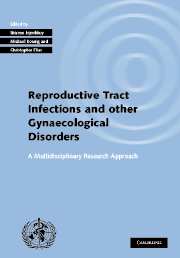 Investigating Reproductive Tract Infections and Other Gynaecological Disorders
Investigating Reproductive Tract Infections and Other Gynaecological Disorders Book contents
- Frontmatter
- Contents
- List of contributors
- Foreword by Paul F.A. Van Look
- Acknowledgements
- 1 Introduction and overview
- 2 Defining reproductive tract infections and other gynaecological morbidities
- 3 The social context of gynaecological morbidity: correlates, consequences and health seeking behaviour
- 4 Reproductive health: men's roles and men's rights
- 5 Study design for the measurement of gynaecological morbidity
- 6 Alternatives to community-based study designs for research on women's gynaecological morbidity
- 7 Community interaction in studies of gynaecological morbidity: experiences in Egypt, India and Uganda
- 8 Definitions of clinically diagnosed gynaecological morbidity resulting from reproductive tract infection
- 9 Laboratory tests for the detection of reproductive tract infections
- 10 Laboratory methods for the diagnosis of reproductive tract infections and selected conditions in population-based studies
- 11 The value of the imperfect: the contribution of interview surveys to the study of gynaecological ill health
- 12 Qualitative methods in gynaecological morbidity research
- 13 Integrating qualitative and quantitative methods in research on reproductive health
- 14 Interpreting results from different sources of data
- 15 Turning research into action
- Appendix A Notes on contributors
- Index
9 - Laboratory tests for the detection of reproductive tract infections
Published online by Cambridge University Press: 07 December 2009
- Frontmatter
- Contents
- List of contributors
- Foreword by Paul F.A. Van Look
- Acknowledgements
- 1 Introduction and overview
- 2 Defining reproductive tract infections and other gynaecological morbidities
- 3 The social context of gynaecological morbidity: correlates, consequences and health seeking behaviour
- 4 Reproductive health: men's roles and men's rights
- 5 Study design for the measurement of gynaecological morbidity
- 6 Alternatives to community-based study designs for research on women's gynaecological morbidity
- 7 Community interaction in studies of gynaecological morbidity: experiences in Egypt, India and Uganda
- 8 Definitions of clinically diagnosed gynaecological morbidity resulting from reproductive tract infection
- 9 Laboratory tests for the detection of reproductive tract infections
- 10 Laboratory methods for the diagnosis of reproductive tract infections and selected conditions in population-based studies
- 11 The value of the imperfect: the contribution of interview surveys to the study of gynaecological ill health
- 12 Qualitative methods in gynaecological morbidity research
- 13 Integrating qualitative and quantitative methods in research on reproductive health
- 14 Interpreting results from different sources of data
- 15 Turning research into action
- Appendix A Notes on contributors
- Index
Summary
Valid laboratory assays for the detection of reproductive tract infections are necessary to confirm suspected reproductive tract infections in symptomatic individuals, identify infections in asymptomatic individuals, investigate cases of resistance to usual treatment, monitor the evolution of pathogen sensitivity to antimicrobial agents and conduct research on reproductive tract infection prevalence and incidence. An optimal laboratory test for the diagnosis of infection should be simple to perform, sensitive, specific, reproducible, objective, rapid, inexpensive and should require no special equipment.
In recent years, new methods to detect reproductive tract infections have been developed using sophisticated molecular biology techniques. Molecular detection techniques do not rely on the ability to culture or directly observe intact organisms but are designed to detect specific cellular antigens or nucleic acids. Therefore, because viable and nonviable microorganisms can be detected, stringent transport requirements for clinical samples are no longer needed. The development of molecular detection assays has led to the ability to use one sample for the detection of many organisms, to test for multiple organisms in one assay and to automate assays. Due to their extreme sensitivity, newly developed nucleic acid amplification systems allow the use of samples obtained by noninvasive methods, including patient self-sampling and urine collection. In addition, certain assays are used to determine the number of nucleic acid copies in a sample. Some of these new molecular methods meet many of the criteria for optimal tests and have improved the diagnosis of reproductive tract infections
- Type
- Chapter
- Information
- Investigating Reproductive Tract Infections and Other Gynaecological DisordersA Multidisciplinary Research Approach, pp. 225 - 260Publisher: Cambridge University PressPrint publication year: 2003


